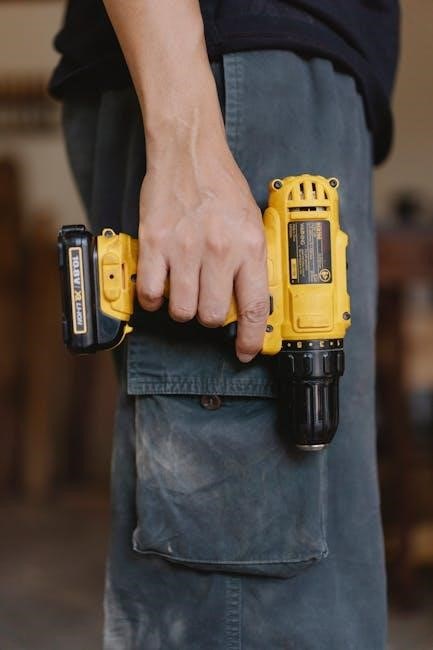Welcome to the Handyman Legend Guide, your ultimate resource for mastering DIY skills, essential tools, and safety practices. Explore projects, repairs, and expert tips to build confidence and tackle any task with ease. Dive in and start your DIY journey today!
Overview of the Guide
The Handyman Legend Guide is a comprehensive resource designed to empower individuals with essential DIY skills, tool knowledge, and safety practices. It covers a wide range of topics, from basic repairs to advanced projects, ensuring readers gain confidence in tackling home improvements. With detailed instructions, expert tips, and visual aids, this guide caters to all skill levels, helping homeowners and aspiring handymen master their craft. Whether you’re fixing a leaky faucet or building custom furniture, this guide provides the insights and techniques needed to succeed. Dive in and transform your space with ease and precision.
Importance of DIY Skills in Modern Life
Mastering DIY skills is essential in today’s fast-paced world, offering empowerment, cost savings, and a sense of accomplishment. By learning to handle repairs and projects, individuals gain self-sufficiency, reducing reliance on external services. DIY fosters creativity, enhances problem-solving abilities, and promotes sustainability. It also provides a fulfilling hobby, allowing people to personalize their living spaces. In a world where convenience often comes at a cost, DIY skills empower individuals to take control of their environment, save money, and enjoy the satisfaction of creating something with their own hands.

History of the Handyman Profession
The handyman profession traces its roots to medieval craftsmen and has evolved over centuries, adapting to modern demands. Today, it embodies versatility, skill, and problem-solving expertise.
Evolution of DIY Culture
DIY culture has grown from medieval craftsmanship to modern-day home improvement. The 20th century saw a rise in DIY due to post-war reconstruction and the availability of tools. Today, the internet and social media fuel DIY projects, offering tutorials and inspiration. This shift reflects a desire for self-sufficiency, cost savings, and personal fulfillment. DIY has become a lifestyle, empowering individuals to tackle repairs, renovations, and creative projects with confidence and skill.
Key Figures in Handyman History
The handyman profession has been shaped by influential figures who championed DIY culture and empowerment. From skilled tradespeople to modern-day educators, these individuals have inspired generations to embrace self-sufficiency. Magazines like Family Handyman and experts like Norm Abram have played pivotal roles in democratizing DIY knowledge. Their contributions have transformed home improvement from a niche skill to a mainstream movement, empowering millions to take on projects with confidence and creativity.
Essential Skills for Every Handyman
Mastering problem-solving, attention to detail, and time management are vital. Basic knowledge of materials, tools, and safety ensures efficiency and quality in every DIY or repair task.
Basic Toolkit for Beginners
A well-equipped toolkit is essential for any handyman. Start with a tape measure, hammer, screwdrivers, pliers, and a utility knife for basic tasks. Add a level, wrench, and screwdriver set for versatility. Include safety gear like gloves and goggles to protect yourself while working. These tools will help you tackle simple repairs and DIY projects with confidence. Remember, quality tools last longer and ensure better results. Always keep your toolkit organized and within reach to streamline your workflow and stay prepared for any task.
Safety Tips and Best Practices
Safety is paramount in any DIY or repair task. Always wear protective gear like gloves, safety glasses, and a dust mask. Ensure proper tool usage and avoid loose clothing that could get caught. Keep work areas clean and well-lit to prevent accidents. Store tools securely and out of children’s reach. Regularly inspect tools for damage and maintain them properly. Follow manufacturer instructions and never overload equipment. Keep a fire extinguisher nearby and ensure good ventilation when using chemicals. Safety habits prevent injuries and ensure successful project outcomes. Blunt nail ends can prevent wood splitting, enhancing safety and precision in woodworking tasks.
Understanding Common Household Repairs
Mastering common household repairs empowers homeowners to save money and maintain their properties efficiently. Start with simple fixes like leaky faucets, clogged drains, and patching holes in walls. Learn to identify the root cause of issues to apply the right solution. For plumbing, a wrench and plunger often suffice. For drywall, spackling paste and sandpaper can hide imperfections. Keep essential tools and materials on hand to tackle repairs promptly. Practice makes perfect—start with small tasks to build confidence and skills. Regular maintenance prevents minor issues from becoming major problems, ensuring a safe and comfortable living space.
DIY Projects for All Skill Levels
Discover a variety of DIY projects, from simple crafts to complex builds, designed to suit every skill level. Unleash creativity and functionality in your home with ease.
Simple Projects for Beginners
Start your DIY journey with easy, rewarding projects like building a birdhouse, assembling shelves, or fixing a leaky faucet. These tasks require basic tools and minimal expertise. Begin with small woodworking tasks, such as crafting a cutting board or repairing furniture. Safety is key, so always use protective gear and follow instructions. Blunt nails to prevent splitting wood and use a level for precise alignments. These projects build confidence and lay the foundation for more complex tasks. Perfect for newcomers, they offer quick results and a sense of accomplishment.
Intermediate Projects for Skill Development
Take your skills to the next level with intermediate projects like installing shelves, tiling a backsplash, or building a garden bench. These tasks enhance your carpentry and plumbing skills. Learn to measure accurately with a tape measure and level, ensuring professional results. Use power tools like drills and sanders for efficiency. Practice techniques like mitering corners or grouting tile. These projects challenge you to refine your craftsmanship, preparing you for advanced tasks while boosting your confidence as a handyman. Safety and precision are essential for success.
Advanced Projects for Seasoned Handymen
For experienced handymen, advanced projects like custom cabinetry, intricate tile installations, or full bathroom remodels offer a chance to showcase expertise. These tasks require precision, specialized tools, and a deep understanding of materials. Mastering techniques like multi-angle cuts, complex electrical wiring, and advanced plumbing systems can elevate your skill set. Safety remains paramount, especially when working with power tools or in confined spaces. Tackle these challenges to refine your craftsmanship and deliver professional-grade results that stand out. These projects are perfect for those ready to push their limits and achieve exceptional outcomes.

The Business of Being a Handyman
Turn your handyman skills into a thriving business with strategies for pricing, marketing, and managing clients. Learn how to grow your reputation and secure steady work effectively.
Starting a Handyman Business
Starting a handyman business begins with identifying your skills and services. Define your expertise, from carpentry to plumbing, and ensure you have the necessary licenses. Create a budget for tools and marketing. Build a client base by networking and offering competitive rates. Highlight your reliability and quality workmanship. Invest in a professional website and social media presence to promote your services. Understand client needs and communicate clearly to deliver exceptional results. Safety and professionalism are key to building trust and growing your business successfully.
Pricing and Billing Strategies
Handyman services typically cost between $50 to $125 per hour, depending on experience and location. Self-employed handymen charge $50-$80, while corporate services range from $75-$125. Consider offering flat rates for specific jobs to simplify billing. Create a clear pricing list, including labor and materials. Provide detailed invoices with breakdowns of costs. Offer discounts for long-term projects or referrals to attract repeat clients. Ensure transparency in your pricing to build trust and maintain a loyal customer base. A well-structured billing strategy ensures fair compensation and satisfied clients.
Marketing Your Handyman Services
Effective marketing is crucial for attracting clients. Utilize online platforms like social media and local directories to showcase your work. Create a professional website with project portfolios and customer testimonials. Offer free consultations to build trust. Partner with local hardware stores for referrals. Invest in targeted ads highlighting your expertise. Regularly share DIY tips and tricks on blogs or videos to establish authority. Encourage satisfied clients to leave reviews and refer friends; Consistent branding and excellent customer service will help differentiate your business in a competitive market.
Handyman Tools and Equipment
Essential tools include tape measures, screwdrivers, and hammers. Power tools enhance efficiency for advanced tasks. Proper maintenance ensures longevity and safety, vital for every handyman.
Must-Have Tools for Every Handyman
A well-stocked toolkit is essential for any handyman. Basic tools include a tape measure, level, hammer, screwdrivers, pliers, and wrenches. These are the foundation for most DIY tasks. Add a utility knife, wire cutters, and a multi-bit screwdriver for versatility. Power tools like a cordless drill and impact driver are must-haves for more complex projects. Don’t forget safety gear, such as gloves and safety glasses, to protect yourself while working. These tools will help you tackle a variety of tasks with confidence and efficiency.
Power Tools for Advanced Projects
Power tools elevate your DIY game, enabling complex tasks with precision. A cordless drill offers versatility for drilling and driving screws. An impact driver excels at heavy-duty driving. Circular saws efficiently cut lumber, while reciprocating saws handle tough materials like metal and PVC. Rotary hammers are indispensable for masonry work. These tools are essential for professionals and serious DIYers, ensuring efficiency and safety in advanced projects.
Tool Maintenance and Care
Maintaining tools is crucial for safety and efficiency. Regularly clean and dry tools to prevent rust, and store them properly to avoid damage. Sharp blades and bits ensure precise cuts, while lubrication keeps moving parts functioning smoothly. Inspect tools for wear and tear, replacing worn or damaged parts promptly. Proper maintenance extends tool life and ensures reliability. The Handyman Legend Guide offers practical tips for caring for your tools, helping you keep them in top condition for years of dependable service.

Home Maintenance and Repair Guides
Master essential skills for plumbing, electrical, and carpentry repairs. Learn to identify common issues and apply cost-effective solutions. This guide empowers you to maintain your home with confidence.
Plumbing Basics Every Homeowner Should Know
Understanding basic plumbing is crucial for every homeowner. Learn to identify common issues like leaks, clogs, and water pressure problems. Familiarize yourself with essential tools such as pipe wrenches and plungers. Discover how to fix leaky faucets, unclog drains, and locate shut-off valves. Proper maintenance can prevent costly repairs. Regularly inspect pipes for corrosion and ensure good water flow. With these skills, you’ll handle minor plumbing tasks with confidence and save money on professional services. Keep your home’s plumbing system in top shape.
Electrical Repairs for the DIY Enthusiast
Mastering basic electrical repairs can save time and money. Start by learning to safely handle electrical systems, always turning off power before work. Use a voltage tester to ensure circuits are de-energized. Replace faulty outlets, fix flickering lights, and repair loose connections. Invest in essential tools like screwdrivers, pliers, and wire strippers. Understand circuit breakers and fuses to diagnose issues. For complex tasks, consult diagrams or tutorials. Remember, safety is paramount—know when to call a professional if a problem exceeds your skill level.
Carpentry and Woodworking Essentials
Carpentry and woodworking are fundamental skills for any handyman. Start by understanding basic tools like saws, sanders, and drills. Learn how to measure, cut, and assemble wood accurately. Sanding is crucial for smooth finishes, while proper joint techniques ensure durability. Practice building simple projects like shelves or birdhouses to hone your skills. Always use protective gear and follow safety guidelines. Experiment with different wood types and finishes to enhance your creations. Mastering these essentials will open the door to more complex and rewarding woodworking projects.
Advanced Handyman Techniques
Mastering advanced handyman techniques requires precision and creativity. From intricate woodwork to complex repairs, these skills elevate your expertise. Specialized tools and innovative methods enable you to tackle challenging projects efficiently, ensuring professional results every time. Expand your capabilities with detailed guides and expert tips, transforming your workspace and enhancing your problem-solving abilities. These techniques are designed to help you overcome difficult tasks with confidence and ingenuity, making you a versatile and skilled handyman.
Mastering Complex Repairs
Mastering complex repairs requires a combination of skill, patience, and knowledge. Start by understanding the root cause of the issue, whether it’s a structural problem or a malfunctioning system. Use specialized tools and techniques to ensure precision and safety. For example, when dealing with intricate woodwork, employ methods like dovetail joints or mortise and tenon to achieve durability. Practice on smaller projects before tackling larger ones to build confidence. Additionally, consult detailed guides or seek expert advice to refine your approach. Remember, complex repairs demand attention to detail and a systematic mindset to deliver professional results. By honing these skills, you’ll become adept at handling even the most challenging tasks with ease and efficiency.
Specialized Skills for Professional Handymen
Professional handymen must possess a diverse set of specialized skills to excel in their craft. Proficiency in advanced carpentry, such as custom cabinetry and intricate woodworking, is essential. Electrical expertise, including circuit installation and troubleshooting, is another critical area. Plumbing skills, from pipe fitting to fixture installation, are also vital. Additionally, mastering masonry, drywall repair, and smart home technology integration can set a handyman apart. These specialized skills not only enhance versatility but also open doors to higher-paying projects and client trust. Continuous learning and adaptation to new techniques ensure long-term success in this dynamic field.
Innovative Solutions for Common Problems
Handymen often face common issues requiring creative solutions. For instance, fixing a leaky pipe without replacing it can be done with epoxy putty. Creaky floors can be silenced using felt pads under floorboards. Drafty windows can be sealed with weatherstripping or clear plastic film. These innovative fixes save time and money. Utilizing everyday items like glue, clamps, and rubber seals can transform quick repairs into long-term solutions. Such resourcefulness enhances efficiency and reduces costs, making handymen invaluable for homeowners. These clever hacks turn minor annoyances into major improvements.
Client Communication and Management
Effective client communication is key to building trust and loyalty. Listen actively, provide clear updates, and manage expectations to ensure satisfaction and long-term relationships.
Building Strong Client Relationships
Building strong client relationships is crucial for a successful handyman business. Start by understanding their unique needs and preferences. Clear communication and active listening foster trust. Be approachable, reliable, and transparent in your interactions. Meeting deadlines and delivering quality work enhances satisfaction. Personalized service and follow-ups show you value their business. Positive interactions lead to repeat clients and referrals, which are vital for growth. A loyal client base ensures long-term success and a strong reputation in the industry.
Managing Client Expectations
Managing client expectations ensures smooth project execution and satisfaction. Clearly outline timelines, costs, and deliverables from the start. Regular updates keep clients informed and aligned with progress. Be realistic about what you can achieve, avoiding overpromising. Address concerns promptly to prevent misunderstandings. Setting clear boundaries and maintaining professionalism builds trust. By balancing client needs with practical limitations, you create a positive experience that fosters loyalty and repeat business.
Effective Communication Strategies
Effective communication is key to successful client relationships. Always listen actively to understand their needs and concerns. Provide clear, honest updates on project progress and timelines. Use simple, jargon-free language to ensure clarity. Regular check-ins build trust and address issues early. Be approachable and responsive to questions, fostering a collaborative environment. Document discussions to avoid misunderstandings. By communicating clearly and respectfully, you ensure client satisfaction and maintain a professional reputation. Strong communication skills are essential for any successful handyman business.
Safety and Liability
Prioritize safety in every project with proper protocols and protective gear. Understand liability risks and ensure adequate insurance coverage to protect yourself and clients from unforeseen incidents.
Safety Protocols for DIY Projects
Safety is paramount in any DIY project. Always wear protective gear like gloves and goggles. Ensure proper ventilation when using chemicals and keep tools sharp for controlled cuts. Maintain a clean workspace to avoid tripping hazards. Use power tools according to manufacturer guidelines and unplug them when not in use. Keep a fire extinguisher nearby and have a first aid kit accessible. Never skip safety protocols to save time—your well-being is worth the extra precaution. Stay alert and focused to prevent accidents and ensure successful project outcomes.
Understanding Liability as a Handyman
Liability is a critical concern for handymen, as it involves legal responsibility for damages or injuries. Proper insurance coverage is essential to protect yourself and clients. Ensure clear contracts outlining scope, responsibilities, and limitations. Communicating effectively with clients helps manage expectations and reduce disputes. Understanding local laws and regulations is vital to avoid legal issues. Maintaining professionalism and adhering to safety standards minimizes risks. Liability insurance options, such as general liability or workers’ compensation, can safeguard your business and provide peace of mind while operating as a handyman.
Insurance Options for Handymen
Protecting your business with the right insurance is crucial. General liability insurance covers accidents and property damage, while workers’ compensation ensures protection if employees are injured. Equipment insurance safeguards your tools and gear. Umbrella policies provide additional coverage for high-risk situations. Compare insurance options to find the best fit for your business size and services. Consulting with an insurance broker can help tailor policies to your needs, ensuring comprehensive protection and peace of mind while operating as a handyman.

Resources for Further Learning
Explore books, online courses, and communities to deepen your DIY expertise. The Family Handyman magazine and specialized forums offer invaluable tips and inspiration for all skill levels.
Recommended Books for Handymen
Discover essential books like The Handymans Book and Family Handyman, offering step-by-step guides for woodworking, electrical repairs, and home improvements; These resources provide detailed instructions, color illustrations, and practical advice for all skill levels. From basic DIY projects to advanced techniques, these books are indispensable for mastering handyman skills. Explore topics like tool maintenance, safety protocols, and innovative solutions. Available at online retailers and local bookstores, these guides are perfect for beginners and seasoned professionals alike. Enhance your DIY journey with these trusted resources.
Online Courses and Tutorials
Expand your DIY expertise with online courses and tutorials designed for handymen. Platforms like Udemy and Coursera offer comprehensive classes on woodworking, electrical work, and home repair. Learn from professionals with step-by-step guides and hands-on projects. These courses cater to all skill levels, from beginners to advanced handymen. Gain practical skills, safety tips, and innovative solutions to tackle any project confidently. Enroll today and enhance your DIY journey with professional instruction and real-world applications.
Communities and Forums for Handymen
Join vibrant online communities and forums where handymen share tips, ask questions, and showcase their projects. Platforms like Reddit’s r/HomeImprovement and r/Handyman offer invaluable advice and support. Specialized forums delve into niche topics like woodworking or plumbing, connecting you with experts and enthusiasts. These spaces foster collaboration, helping you troubleshoot challenges and gain insights from real-world experiences. Engage with fellow DIY enthusiasts, learn from their successes and mistakes, and grow your skills through shared knowledge and camaraderie.
Success Stories and Case Studies
Inspiring stories of successful handymen, showcasing their journey from novice to expert. Discover how creativity and problem-solving transformed their lives and projects. Real-life examples to learn and grow.
Inspiring Stories of Successful Handymen
Meet handymen who transformed their lives through creativity and determination. From fixing homes to building businesses, their journeys highlight resilience and innovation. Learn how they turned simple DIY projects into thriving careers, solving everyday problems with unique solutions. Discover how one handyman used a golf tee to fix a door hinge, while another built a successful business from scratch. These stories showcase how DIY skills can lead to personal growth and financial success, inspiring you to embrace your own handyman potential.
- From novice to expert, their stories reveal the power of DIY.
- Transforming lives and homes through creativity and skill.
Lessons Learned from Real-Life Projects
Real-life projects reveal valuable lessons for handymen. For instance, fixing a door hinge with a golf tee or solving a clogged sink highlights creativity and resourcefulness. These examples show how everyday problems can be solved with simple, innovative solutions. Safety remains paramount, as seen in tips like blunting nail ends to prevent wood splitting. These experiences emphasize the importance of preparation, patience, and quick thinking, offering practical insights for aspiring handymen to refine their skills and tackle challenges effectively.
- Simple fixes can solve complex problems.
- Creativity and safety go hand in hand.
Empowering you with essential skills and confidence to tackle any project, the Handyman Legend Guide transforms DIY enthusiasts into masters of home improvement and creative problem-solving.
Final Thoughts on Mastering DIY Skills
Mastering DIY skills is a journey of creativity and growth. Start with simple projects like fixing furniture or building shelves to build confidence. As you progress, embrace advanced techniques like carpentry and electrical work. Remember, safety and patience are key. The Handyman Legend Guide equips you with essential tools and knowledge to transform your home and life; Keep experimenting, learning, and pushing your limits. DIY mastery is not just about fixing things—it’s about creating something truly meaningful and lasting.
Encouragement for Aspiring Handymen
Embrace your passion for DIY and take the first step toward becoming a skilled handyman. Every project, no matter how small, is an opportunity to learn and grow. Don’t fear mistakes—they are part of the journey. With patience and practice, you’ll gain confidence and expertise. Remember, the Handyman Legend Guide is your trusted companion, offering tips, tricks, and inspiration to help you succeed. Start today and transform your ideas into reality!
About the Author
The Handyman Legend Guide is authored by a seasoned expert with decades of experience in DIY projects, woodworking, and home repairs. With a passion for empowering others, the author has compiled this comprehensive guide to share essential skills and techniques. Their mission is to inspire both beginners and seasoned handymen to tackle projects with confidence. Drawing from real-world expertise, the author provides practical advice and innovative solutions to common challenges, making this guide an indispensable resource for anyone eager to master the art of DIY.
